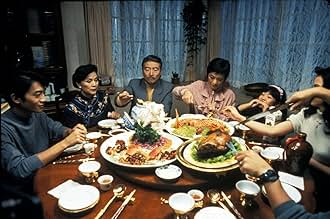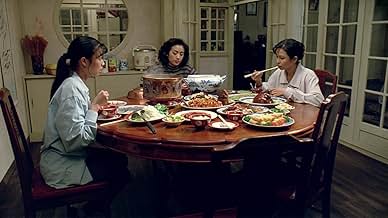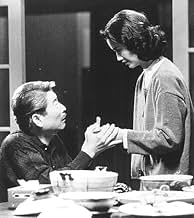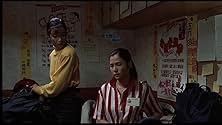IMDb RATING
7.8/10
24K
YOUR RATING
A senior chef lives with his three grown daughters; the middle one finds her future plans affected by unexpected events and the life changes of the other household members.A senior chef lives with his three grown daughters; the middle one finds her future plans affected by unexpected events and the life changes of the other household members.A senior chef lives with his three grown daughters; the middle one finds her future plans affected by unexpected events and the life changes of the other household members.
- Nominated for 1 Oscar
- 6 wins & 15 nominations total
Wang Yu-wen
- Jia-Ning
- (as Yu-Wen Wang)
Chen Chao-jung
- Guo Lun
- (as Chao-jung Chen)
Ah-Lei Gua
- Madame Liang
- (as Ya-Lei Kuei)
- Director
- Writers
- All cast & crew
- Production, box office & more at IMDbPro
Featured reviews
Ang Lee has turned what might have been merely an extended Taiwanese soap opera into a wise and warm exploration of family relationships, love and friendship, against the backdrop of a traditional society adapting to the modern world. Fascinating in themselves, the food preparation sequences serve as a metaphor for the skill required to transform bare existence into a rich life (and perhaps also as a metaphor for film making, where similar care and deftness are required).
The film focuses on the strained relations between master chef Chu (Sihung Lung) and his three unmarried daughters, and on the relationships of all four in love and at work. These relationships run the gamut from first love to love the second time around; from those based almost solely on sex to those based on none. (Some of the most touching scenes are those between Chu and his older colleague Wen (Jui Wang.))
Via the various workplaces Lee subtly shows us the changing face of Taiwanese society. Despite her father's profession, and seemingly with his approval, his youngest daughter works in a fast-food outlet; the eldest has converted to Christianity, and teaches science to boys, who treat her with a mixture of traditional deference and western-style insolence; the middle daughter is a successful airline executive, but only because time-honoured attitudes debarred her, as a woman, from following in her father's footsteps as a cook.
Unlike the classic Hollywood film, there is little out-and-out conflict in this movie, which seems to be based more on the Chinese philosophical concept of Yin and Yang, mutually dependent opposites. But whatever its underlying cinematic rationale, it is a masterpiece.
The film focuses on the strained relations between master chef Chu (Sihung Lung) and his three unmarried daughters, and on the relationships of all four in love and at work. These relationships run the gamut from first love to love the second time around; from those based almost solely on sex to those based on none. (Some of the most touching scenes are those between Chu and his older colleague Wen (Jui Wang.))
Via the various workplaces Lee subtly shows us the changing face of Taiwanese society. Despite her father's profession, and seemingly with his approval, his youngest daughter works in a fast-food outlet; the eldest has converted to Christianity, and teaches science to boys, who treat her with a mixture of traditional deference and western-style insolence; the middle daughter is a successful airline executive, but only because time-honoured attitudes debarred her, as a woman, from following in her father's footsteps as a cook.
Unlike the classic Hollywood film, there is little out-and-out conflict in this movie, which seems to be based more on the Chinese philosophical concept of Yin and Yang, mutually dependent opposites. But whatever its underlying cinematic rationale, it is a masterpiece.
I came across Yin Shi Nan Nu just by chance, when one day I was sorting DVD's in my local store. I was curious about the name in Spanish, and I have seen other movies by Ang Lee, but I have never repented for my sudden decision to take the movie home. This is a brilliant portrait of a family on the verge of being torn apart by their personal differences and the ominous presence of modernity, which has started to undermine the roots of the traditional Taiwanese family life. The presence of traditional Chinese Cuisine, in which Chu is both a master and the heir to hundreds of years of knowledge, serves as the perfect background to place the characters, as a metaphor for a way of life that is quickly disappearing, threatened by fast food and changes in family values. The director does not, however, focuses on mellow or sweetened scenes to show the conflict, but he maintains a humorous tone throughout the movie, placing the actors' performances on subtle gestures and witty lines which rely heavily on understatement and comedy-like situations. The basic premise of the movie suggests that change is not only inevitable but also necessary. However, the old values still need to be cherished and passed on to the next generation since they are the foundations which give sense and meaning to a life which tends to assimilate happiness to disposable items and economic success. In doing so, Chu and her daughters get reconciled, as well as their traditional background comes to terms with modernity.
Eat, Drink, Man, Woman is one of the best films of all time. It has all the elements of a great movie. From the opening shot to the final I was absolutely riveted to this compelling, truthful, beautiful, and humorous look into the lives of a Taiwanese family. Ang Lee, known quite famously now for "Crouching Tiger, Hidden Dragon" and the upcoming "Hulk" has done a masterful job of directing and storytelling. The cinematography is INCREDIBLE. The movie as mentioned focuses on on Widower, Master Chef Chu, who is having a hard time relating to his three independent daughters. He attempts to communicate his love for them by creating these incredible gourmet dinners. The daughters are very defined, each with a different personality. The eldest, is a Christian, which is the first time in a movie I have ever seen, where a Christian is portrayed in a favorable light. She is struggling with being an old maid and the fear of leaving her Father uncared for if she does get married. The second daughter is wild and rebellious. She is portrayed extremely well by the ultra sexy Chien Lien Wu. This woman is absolutely stunning!!! She is torn between three things, her career, her desire to be independent, and her liason's with two men, one who is married. The third daughter is portrayed sweetly and innocent who ends up stealing her best friends boyfriend away. There are many plot twists and turns, but in the end, the movie finishes in a beautiful and happy way. I have now watched this movie twenty times and I think it is a great contribution to the film world. I wish more people knew about it here in the States. This movie can move you to being a better person. On a side note, I highly recommend you order some Chinese food, because you will be starving for it before the movie is over.
By now, Ang Lee is best known for "Crouching Tiger, Hidden Dragon", "Brokeback Mountain" and "Life of Pi". If you're not familiar with his earlier work, it's worth checking out. Key among it is 1994's Academy Award-nominated "Yǐn shí nán nǚ" ("Eat Drink Man Woman" in English). I understand that this was part of what has become known as Lee's Father Knows Best trilogy. In this case, an aging chef in Taipei tries to come to terms with the different career paths that his daughters have chosen.
Without a doubt, the best part of the movie is seeing the food prepared. The opening scene shows the father preparing a feast for himself and his daughters. And boy does he put in a LOT of effort! But as the movie progresses, it becomes clear that the meals are only half the story. There's also the events in the characters' lives, as they seek out relationships. Might it also be time for the father to seek out a relationship?
This is definitely one that I recommend. As I read somewhere, the assortment of food representations life: there's a lot available, but you have to decide what you'll choose. A fine one. Another one of Lee's good movies is "The Ice Storm" (a downer if there ever was one).
Without a doubt, the best part of the movie is seeing the food prepared. The opening scene shows the father preparing a feast for himself and his daughters. And boy does he put in a LOT of effort! But as the movie progresses, it becomes clear that the meals are only half the story. There's also the events in the characters' lives, as they seek out relationships. Might it also be time for the father to seek out a relationship?
This is definitely one that I recommend. As I read somewhere, the assortment of food representations life: there's a lot available, but you have to decide what you'll choose. A fine one. Another one of Lee's good movies is "The Ice Storm" (a downer if there ever was one).
The well-traveled metaphor of food as communication is given a tender, appealing treatment in Ang Lee's finely observed film about a widower whose aging and loneliness have caused him to lose touch with his three grown daughters, each of whom is looking for love in modern-day Taiwan. The father (a gallant Sihung Lung) is a master chef who has begun to lose his sense of taste while attempting to come to grips with his daughters' increasing independence and the failing health of his best friend (Jui Wang); he begins to question the basis of existence, namely love and food. The daughters, meanwhile, feeling cramped by their father's distance, begin to explore notions of freedom from their cramped quarters. Lee is in a positive, sympathetic frame of mind here, articulately exploring the theme of alienation that he would later revisit with a much more gloomy perspective in `The Ice Storm' and though the film holds virtually no surprises, it is a stylistic success, easy to like and moving effortlessly with a superior sense of rhythm; it's always pleasing, even when the content feels overly familiar. He demonstrates a healthy respect for his characters (with the exception of a divorcee whose bitter views of marriage don't stop her from pursuing Lung)--everyone gets to play out their lives with dignity and happiness and without an ounce of filmmaker moralizing.
Did you know
- TriviaThe opening sequence - in which a Sunday lunch is lovingly prepared - took over a week to film.
- GoofsAs Chu is downing shots at the last Sunday dinner, he spills some on the collar of his jacket. When he stands up to makes his announcement, the stain is gone.
- SoundtracksAve Maria
Composed by Giuseppe Verdi
Performed by The Westminster Choir
Courtesy of Chesky Productions, Inc.
Details
- Release date
- Countries of origin
- Languages
- Also known as
- Comer, beber, amar
- Filming locations
- Production companies
- See more company credits at IMDbPro
Box office
- Gross US & Canada
- $7,294,403
- Opening weekend US & Canada
- $155,512
- Aug 7, 1994
- Gross worldwide
- $7,294,403
- Runtime
- 2h 4m(124 min)
- Color
- Sound mix
- Aspect ratio
- 1.85 : 1
Contribute to this page
Suggest an edit or add missing content

























